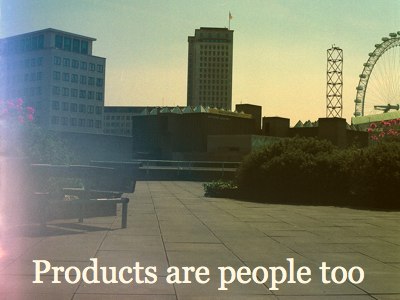Products Are People Too
Products are people too.
I don’t mean that we should make products like intelligent agents, or anthropomorphic products, like little computers with faces drawn on them.
All I mean is that it’s better to operate under that assumption that products have wills and that they act in the world and that we relate to them… than under the assumption that none of those things are true.
So what does this phrase mean? How does this effect what I design?
Well, two points:
First is that we, users, already treat products as actors in the world. We already bend to their will, already defer to them, and already buy other products to fit in with them.
It’s only as designers that we’re negligent, designing for specific utility instead of the whole story. By changing to think like this, we’ll make more humane products which go along, better, with how we want to relate to them.
Second. Now we understand the emergent properties of products better – by saying they’re like people – we can use human solutions as approaches to deal with these same properties.
And saying this is great, because I’ve problematised design in a new way. My question is now, “what makes us human?” Or rather, because I don’t care about biology, and I don’t want to be species-ist or life-ist, “what makes us people?” And from there I can say things like, “if my product was a person, how would it be solving problem X better?”
Now, this conference has been about looking at what being human is all about, so I leave it as an exercise for you to apply many of the ideas.
And what I’m not going to leave you with a full definition of what human is.�
